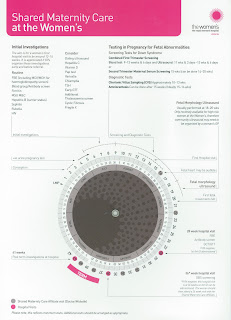There are 78 midwives enrolled for MIDW9010 in this first semester 2013. Assessment is on a series of weekly quizzes, case studies, and preparation of a portfolio that covers the topic.
In this journal I hope to record parts of the course that I find significant.
I have begun reading the study guide, and some of the published literature. Today I would like to record my current practice with regard to the standard or routine screening that women experience in maternity care. The Shared Maternity Care at the Women's prompt-sheet pictured below, with a pregnancy wheel, is a good summary of contemporary expectations in testing and consultations for women in Melbourne today.
 |
| The Women's Hospital guide to tests and investigations - click to enlarge |
My usual practice at present is to ask women who are considering engaging me as their midwife to go to their local GP for the initial investigations. This places the information on the woman's personal health history, and I ask for a copy of results for my notes. At this time they can take a draft letter from me, asking the doctor if she/he is willing to enter a collaborative arrangement with me. With this arrangement the woman is able to claim Medicare rebate for antenatal and postnatal 'items'. The amount of rebate is estimated at $700-$1000 for an episode of care.
When I request tests, such as antibody checks for Rhesus negative women, I ask that a courtesy copy (cc) go to the woman's GP.
One frustration that I face each time I request blood tests or other investigations is that I have no practice software that coordinates the writing of the request slip, and the receiving of the results. I must do this by hand. This is something that may change with the passing of time, as more and more midwives participate in Medicare.
As with many of the more medical aspects of maternity care, I often have a skeptical attitude about the value of the tests. There seems to be an expectation that all women will have several ultrasounds to check the dates (early), for Down Syndrome screening (11+3 to 13+6 weeks), and morphology (18-20 weeks). Other women are advised to have serial fetal growth scans. I have little confidence in the liberal use of ultrasound, that this practice follows the first law of medical ethics, to do no harm. I wonder if my attitude will change, as I read and explore this and other tests in greater depth in the coming months?
Thankyou for your comments
No comments:
Post a Comment
Thankyou for your comment, which will be emailed to me for moderation.